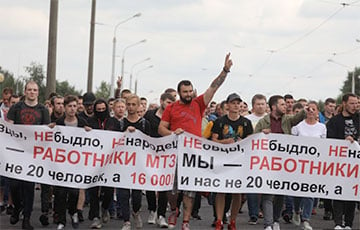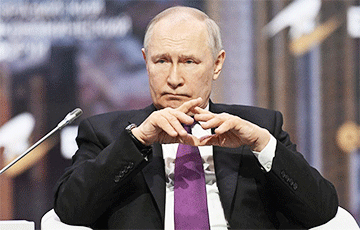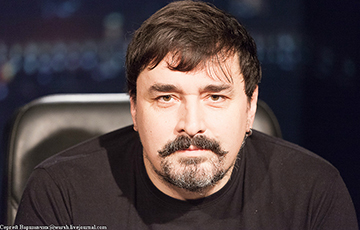Lukashenka Today Does Not Suit Anyone: Neither Belarusians, nor Americans, nor the EU, nor China, nor Russia
15- 10.08.2021, 11:20
- 32,042

He will be gone within a few months.
The coordinator of the European Belarus civil campaign Dzmitry Bandarenka summed up the results of a year of continuous protests in Belarus on the air of the Free Russia Forum YouTube channel.
Charter97.org provides the full text of the interview.
- Greetings to the viewers of the Free Russia Forum channel. Today me and our guest, a Belarusian oppositionist, coordinator of the European Belarus civil campaign Dzmitry Bandarenka, are in the studio. Dzmitry, welcome!
- Good afternoon.
- For those of our viewers who do not know our guest, I will tell you a little about him. Dzmitry Bandarenka is a veteran of the Belarusian liberation movement, a man who for many years was in opposition to the regime of Aliaksandr Lukashenka, fought against him, was a political prisoner, spent about 16 months in prison, and was later forced to immigrate from Belarus. In 2010, at the presidential elections in Belarus, he was a confidant of candidate Andrei Sannikau. Is that correct, Dzmitry?
- Yes.
- Today is exactly one year since the beginning of the Belarusian revolution - this is what many call the series of protests that have engulfed Belarus since August 9, 2020. Now, looking back at this year, at everything that happened, tell me, please, what do you think about it, what was done correctly, and what mistakes were made by the Belarusians in the course of their struggle against the Lukashenka regime?
- I would like to say that it was a decent day, August 9, and a decent year that has passed since then. Frankly, there were several years when, for example, I visited friends in Kyiv and to a certain extent I was ashamed of the fact that I was a Belarusian and for Belarusians. Because, compared to my friends in Ukraine, who gave their lives for the freedom and independence of their country, the Belarusians had nothing to boast about.
The Belarusian revolution changed everything. Of course, I believed in Belarusians, but, for a long time, there was a certain lull, and then the whole world learned about my country. I am very proud of those people who took to the streets, who participated in the resistance for many months.
The situation is completely different: now, in every country, wherever you are, when you say that you are a Belarusian - people express words of support or show a sign of "victory."
Strange as it may seem, the time has not yet come to speak seriously about what was done right and what was not. I would say that the revolution is not over. A revolution does not happen in one day or several months. Someone thinks, probably including me, that the Belarusian revolution began in 2017, when a wave of protests swept across the country - marches of the so-called parasites. Probably, this was such a first impetus. If you look at the history of the 20th century - we remember that revolutionary events in the former Russian Empire, as well as in other countries, took several years. I think it's the same stage now in the post-Soviet space, in my country too.
- Many believe that the main result of the revolution at the moment is the birth of the civil nation of Belarusians in such a complete form. Please tell me, do you agree with this conclusion? Is it noticeable in your feelings, in communication with the Belarusian diaspora?
- Yes, of course, the situation is completely different. I was in Bulgaria recently and met with Belarusians from Minsk and other cities. It was interesting for me to talk to them live, I asked why in 2010 people did not come out so massively, although there were tens of thousands, and why they did in 2020. People can't answer that question to the end, but you can see that they are completely different.
I talked with people who, for example, signed for Valery Tapkala and then they participated in all the protests. It's just that these are both qualitative and quantitative changes because today, all Belarusians are in opposition to the regime, and absolutely everyone hates Lukashenka.
The diaspora in Poland cannot stop, people several times a week hold various rallies, various marches, react to the events that take place. For example, the scandal with athlete Tsimanouskaya and her arrival in Warsaw.
Before August 9, actions of solidarity were held in many countries of the world, and I think that today they will also continue.
- By the way, how was female track and field athlete Tsimanouskaya received in Warsaw?
- It is hard to say. I did not meet with her, I was just at the airport in Warsaw, there were a lot of journalists, but I did not see her. But the reaction was very serious, there was information in all Polish media, there was Tsimanouskaya's press conference, which was shown on all Polish channels. Therefore, even for Poland, this is a rather significant event. And everyone is waiting to know who she will play for because she is not a politician and said that her goal is the next Olympic Games, other international starts.
Many say that the person was just a citizen, she defended her position and, if every Belarusian at his workplace did the same, the situation in the country would be a bit different.
- Returning to the events in Belarus itself. What is happening there now, is there any information, are any protest actions being prepared?
- Resistance continues. Once I was one of the leaders of the Zubr movement, I will say that, then, in order for the actions to take place, in order for the products to be distributed, it was necessary to be engaged in management, to stimulate the commanders, to meet with them. They communicated with activists very actively, that is, it was such a process where it was necessary to convince people, to explain to them. In the early 2000s, this movement was quite massive and effective, and now, people in Belarus are doing the same but only with much more activity and no one being in charge of them. They negotiate by themselves, they look for resources by themselves, they print and produce their own national flags. And this is all under much more difficult conditions. So the resistance continues.
Well, you've probably heard this strategy - "sanctions, strikes, protests." The sanctions are already working, largely thanks to the activities of the Belarusian diaspora, as well as the stupid steps of Lukashenka. The situation with the plane and the scandal at the Olympics probably worked first of all.
Now the second stage is the strikes. Some of the workers' leaders who took part in strikes and protests in Belarus have been imprisoned and are now abroad. They have connections with the activists of the enterprises, and they believe that the strike in Belarus is possible.
They believe that this is one of the methods that is relatively safe today and, in combination with sanctions, can deal a fairly serious blow to the regime. This is the Belarusian Workers' Association, one of the representatives of which is Siarhei Dyleuski - a very unconventional young man, textured, typical Belarusian: kind, huge, two-meter tall. And what's interesting? He can negotiate with everyone, he is a member of the Coordination Council, he can negotiate with the headquarters of Tsikhanouskaya, he communicates with Latushka's NAU, he has good relations with European Belarus, Charter-97, and many bloggers.
The most important thing is that workers-leaders, workers-activists of many enterprises communicate with each other in this Belarusian Association of Workers, today there are about 20 of them. And no matter how hard Lukashenka tries to suppress the independent information component, he does not succeed.
In the USSR, we know that Western radio stations were very jammed, and, objectively, there were not so many users of samizdat. Today, the Belarusian authorities cannot do anything with Telegram. Also, many sites work, YouTube works, it is impossible to block it. The same workers have the opportunity to communicate with their comrades who are abroad and read independent media. Therefore, I am looking at it with optimism and think that a strike in Belarus is possible within the next two months.
- Does the Lukashenka regime have the ability to stop the effect of the strike? For example, get a large number of strikebreakers or try to suppress the strike movement with the army or the police?
- We see what this leads to. For example, the Hrodna Azot enterprise, one of the key enterprises in Belarus, is a producer of nitrogen fertilizers, among other things. It came under international sanctions. They have problems, problems with sales, they give up their branded bags, pack products in bags without brands, they try to sell them in this way.
They have problems, for example, even at the level of logistics, because some ports refuse to do business with them, banks refuse to carry out financial transactions, insurance companies refuse to provide their services.
And the most important thing is that there were even cases when several engineering and technical workers who were active and participated in the strike a year ago were fired. As a result, we see that the enterprise has been in a fever for a whole year: yellow or red smoke or a torch at Azot - this is a normal phenomenon. This means that the workshops are not working properly. This is a very dangerous enterprise from the point of view of ecology, and, since there are not enough specialists, Azot does not work normally. And so it is at every enterprise.
There are critical professions and a critical number of people at each enterprise, which the authorities would like to fire but can't do because no military can be specialists at a chemical enterprise, no strikebreakers can replace employees of the Belarusian Metallurgical Plant. We know when one of the leading IT specialists of this plant was fired - signatures were collected for him, and he simply left for another place.
We know that about 20 thousand IT specialists from Belarus have gone abroad and feel great there. This means that the "vacuum cleaner effect" has arisen in private businesses, and many people from state enterprises can go to these private firms for a completely different salary. Why is there hope and confidence that strikes are possible in Belarus? Because people are dissatisfied with their wages, dissatisfied with their working conditions, and the authorities cannot dismiss people because there is not enough normal working personnel, and this will be a shot not in the leg but the head. Because, by dismissing active, free people, the authorities themselves will cause a strike.
- It turns out that, in a long historical perspective, even in the perspective of probably the next few years, Lukashenka has no way out of this situation. One way or another, he needs to leave, but it is not clear how to do it. Do you think he has some kind of maneuvering ability in this situation?
- I dare to make the prediction that he has no chance even in the medium term, and his exit will be quicker. This exit could happen within a few months.
It rests only on the support of Russia or part of the Kremlin towers. Because having unleashed a war against the European Union, he lost the support of China. As we know, China is the main economic partner of the European Union today. Neither the United States nor the United Kingdom, namely China.
The Chinese were interested in Lukashenka only if he had relatively normal relations with the Europeans. When he launched a war with the EU, he threatened the EU-China transit and vice versa. And, at the same time, even the EU-Russia transit.
In this regard, we know that the Chinese comrades are putting pressure on Moscow to resolve the Belarusian issue because the prospects of the Great Silk Road (investments there for trillions, tens of billions of dollars) are under threat since the Beijing-Paris road after the war between Russia and Ukraine should only go through Belarus. Lukashenka today simply suits neither the Americans, nor the Europeans, nor the Belarusian people, or the PRC. And how much longer Russia will support him is unknown. All these steps with a sharp reduction in gas transit through Belarus may indicate that they are trying to strangle Lukashenka in a fraternal embrace.
- You said that, in your opinion, Lukashenka could leave within the next few months. I understand that forecasts are a thankless task, but nevertheless, do you have at least an approximate understanding of how the situation may develop during these next few months?
- I think that economic sanctions will have an effect. They are already having an effect. I think that, instead of making up for this mistake with the landing of the Ryanair plane, there will be the declaration of war by NATO in the person of the Republic of Lithuania that will also not go unanswered. Because everyone understands that this is a war, that this is Lukashenka's inadequacy.
It can be seen that he really wants to get some kind of hot conflict at the border, but this is not needed even by his allies in Moscow. Lukashenka is on the field of mistakes, he will make these mistakes more and more every day, and life in Belarus is deteriorating, even in the conditions of that terror, the repressions that exist in the country, we receive information that periodically some then there are protests, people are unhappy with salary delays, react to the dismissals of their comrades. It will snowball. If earlier it was not there, now we see that it is a snowball, because the authorities simply do not know what to do.
If there was some kind of agreement with Russia, that we would put out the protests, and you would provide minimal funding, then now the authorities are already at war with the whole world: both with their own people and with all of their neighbors. This will probably manifest itself in the fact that the authorities will not be able to simply pay salaries and pensions, that there will be protests at certain enterprises.
Lukashenka is not the first dictator to leave. Then the close circle, which will understand that it is better not to fall into the abyss with this person, will try to stay afloat, which means pushing him into the abyss alone or with a very close number of people.
- Well then. Let's hope that this will happen soon, that the people of Belarus will finally free themselves. On my behalf, I can add that today it became known that the Minister of Foreign Affairs of Lithuania Gabrielyus Landsbergis said that new sanctions against the Lukashenka regime were being worked out, and it also became known that the United States and Great Britain were also introducing their own package of sanctions. All this tells us that there is gradual strangulation of the Lukashenka regime. Let's hope he leaves as soon as possible and with minimal losses to society. Thank you very much, Dzmitry. Dzmitry Bandarenka and Daniil Konstantinov were with you on the Free Russia Forum channel summing up the results of the Belarusian revolution. Exactly one year has passed since its beginning.
- Thanks a lot.
- Thank you. Stay with us. All the best. Goodbye.










